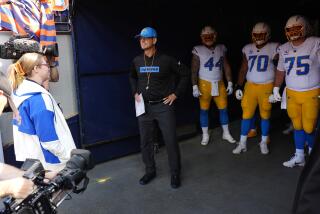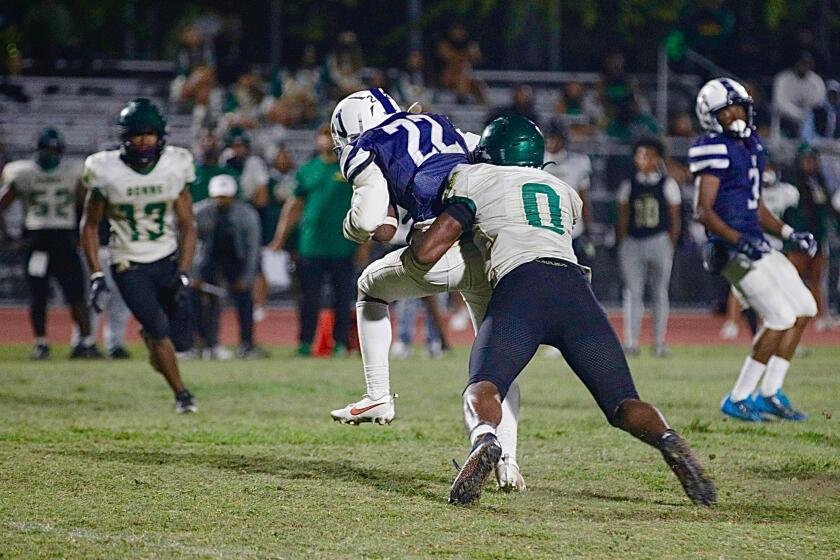Coaches on the Edge : Despite the Sit-Down Rule, the Hotheads of the Sidelines Often Rise to the Occasion
After all of his won-lost records and All-Americans and national titles have become ancient history, the most indelible memory of Indiana Coach Bobby Knight--the patron saint of mad-dog basketball coaches--might be an incident two years ago when he followed one of his world-class swearing exhibitions by becoming the first adult in the annals of the Big Ten to throw a chair across the court. Knight apologized for his unsportsmanlike conduct but was neither spanked nor sent to his room.
One thing about being a mad-dog coach: You donât have to be at a major university. You can misbehave anywhere. In the pros . . . the YMCA . . . high school. In fact, high schools are considered the breeding grounds for mad-dog coaches. Small, intimate gyms overflowing with screaming, rabid fans create a pressurized environment that can push a coach to the edge because of a critical call. And to mad-dog coaches, high school officiating sometimes can be bad enough to make a sane man wish he had a gun.
In high school basketball, the only punishment meted out to mad-dog coaches is a technical foul, and it even takes three Tâs to banish them from a game, at which point theyâre probably baying like a hound at a full moon and in need of a tranquilizer. While these aspiring Bobby Knights might not have attained chair-chucking nirvana like the master, they have been known to throw towels, clipboards and assorted temper tantrums during games. Sometimes before games. Sometimes during postgame encounters with opposing coaches, referees and fans.
âIt can be frustrating being a basketball coach,â said Tim Wilcox, a Burbank clinical psychologist with an interest in sports, âand the normal reaction to intense frustration is anger.â
Mad-dog coaches, Wilcox said, often have a distorted perspective on basketball. âTo them,â he said, âitâs not just a game. They get so caught up in it--eat, drink and sleep the game--they go overboard. Sometimes, thatâs because their livelihood depends on the team, and they canât handle adversity. But if coaching is just part of what they do, if they have well-rounded lives, the game will not be that upsetting to them.â
Although evidence suggests many mad-dog coaches incur technicals for strategic and psychological purposes, there is a point when they rage beyond reason. âYou can tell when a coach is out of control,â said Brian OâHara, girls coach at Louisville High. âItâs when he gets a technical when the other team has the ball, or when he knows he has two Tâs and gets a third. Thatâs ridiculous.â
Like Dr. Jekyll, there is a monster within us all. Mad-dog coaches can have the kind of personality that turns them into Mr. Hyde on the freeways as well as in the gym, or they also can be gentle, mellow individuals who appear normal all day long until they suddenly sprout fangs at a basketball game.
John Harbour belongs in the latter category. A coach at Camarillo High for seven years, he took a sabbatical this season to be with his sons to âtry to get away from being a monster.â Normally mild-mannered, Harbour often found himself blowing up during games, especially early in his career, although his reactions were verbal, not physical. It has been a constant struggle against his inner demons, he said, to change his behavior.
âIt just comes boiling out of me,â he said. âSome coaches in the past accused me of acting like that for the sake of strategy, but, hey, I react to calls. I learned my lesson, though, against Simi Valley two years ago when I got a technical when we were ahead and we wound up losing. That taught me, âI better keep my rear out of the game and never put myself in the position of losing a game for the team.â â
Backsliding, of course, is always possible for a reformed mad-dog coach, particularly one like Harbour. âIâm a large person with a loud voice,â he said. âWhen I get mad, itâs difficult to hide it, and sometimes I wish I could. There are coaches who are not as large or as loud and probably get away with more than I do.â
There is every indication that mad-dog high school coaches are behaving themselves more and more these days. Last season, high schools nationwide instituted the so-called âsit-down ruleâ calling for an automatic technical if a coach stood up during play. What the rule did was limit a coachâs opportunities for civil disobedience. No longer could he stomp up and down on the sideline or chase a referee to the scorerâs table. No longer could he pop off the bench like a Jack-in-the-box to show his displeasure over a call.
âThe rule has toned coaches down, and coaches have done a marvelous job controlling themselves,â said Bill White, principal at Canyon High and CIF rules interpreter for California. âA coach told me, âI did a better job of coaching because of the rule--it forced me to sit down and think.â â
Harbour didnât like the rule at first--âI thought it would hurt my coachingâ--but he now realizes it actually helped by forcing him to behave. âIt was good for me,â said Harbour, who wasnât called for a technical foul in his last season at Camarillo.
But not every coach, of course, likes being glued to the bench. For most, jumping up is a natural reaction, so they are always fighting their instincts. For others, it is a release from the pressures of the game or a chance to make a nonverbal statement or a way to motivate players and fans. Some just enjoy being dramatic and putting themselves in the spotlight.
âItâs a stupid rule,â OâHara said. âIt doesnât make sense. I like to get things out of my system and they make it tough on you. It would be so easy to put some tape on a floor and make a coaching box so a coach can roam a little. Basketball is the most nerve-wracking sport Iâve ever coached, and now you canât even walk up and down.
âThe rule also encourages a weak ref to keep looking at the bench to see if he can call a T, so heâs not watching the game.â
To a mad-dog coach, referees are a contemptible breed. It is the call by the ref--always bad, always unfair, always vindictive in the minds of mad-dog coaches--that triggers a hysterical outburst or irrational act. Earlier this season, Kennedy girls Coach Craig Raub forfeited a game against Louisville as an act of defiance and protest against the officiating.
âIn 15 years of coaching,â Raub said, âthatâs the first time something like this has ever happened.â Although it might be possible for a mad-dog coachâs mind to snap in the heat of battle, Wilcox said, it rarely occurs. âIf you know youâre going to lose the game if you blow, youâre not going to blow,â Wilcox said. âYou should be able to keep it in during the game if you want to.â
Which brings up the possibility that a lot of coaches sometimes might put on an act, manipulating emotions to suit their needs.
âI donât define âlosing itâ as getting a technical,â OâHara said. âIâll do it on purpose to let a ref know I didnât like his call or to fire the team up. Or if the other coach gets a T first, I feel I have to get one--sometimes, if you get the first T the ref feels guilty and will bend over backward to make a favorable call for you.â
Some officials, however, are also experts at gamesmanship. âThe worst thing is when a ref wonât call a technical,â OâHara said, âbecause he doesnât want to give you the satisfaction.â
Hart football Coach Rick Scott has been a basketball official for 15 years and knows that coaches often play head games with him. One coach actually requested a technical. Scott declined, they debated for a while and Scott finally granted his wish.
âWhen I gave him the T, he said âThank you,â then turned to his players and told them, âEven the refs are against us,â â Scott said with a laugh. âBut young coaches--guys coaching JV and freshman ball--are the worst. Theyâre the only ones Iâve ever kicked out of a game.â
Scott, by the way, doesnât like giving technicals when a coach leaves the bench. âItâs hypocritical of me,â he said. âIn football, I roam the sideline like a wild tiger.â
Perhaps the most legendary mad-dog coach in the Valley was Glen Marx, who set a record for disorderly conduct that might never be broken. In December 1979, Marx received 12 technicals for a verbal assault on the referee after his Notre Dame team had defeated Daniel Murphy High, 67-61. The resultant free throws gave Murphy the victory, 72-67. Marx was suspended for a year for violating the CIFâs code of coaching ethics, but the Notre Dame win eventually was reinstated.
What happens to a mad-dog coach whose actions become an embarrassment to the school? Nobody can recall a coach ever being fired for his behavior, which leads to the conclusion that the only thing that can really embarrass a school is a losing season. At Indiana, winning makes Bobby Knightâs conduct tolerable, even acceptable to some.
Said Harbour: âKnight has accomplished a lot but he has some personality problems that are the result of pressure and striving to achieve. In our society, you have to achieve to be a success. But it takes the kind of intensity he has as a coach to get kids to play to a higher level. And he has tremendous control over players.â
The standard procedure for disciplining a mad-dog coach in high school, said Canyonâs White, âis to remind him he is part of the educational program, and if he goes crazy, heâs representing the school. As a principal, if one of my coaches gets bizarre, I have a little discussion with him.â
In the past, the Camarillo administration has talked to Harbour after incidents âthey thought I could have handled better,â he said. âBut thatâs all in the past.â
And so is the monster.
More to Read
Go beyond the scoreboard
Get the latest on L.A.'s teams in the daily Sports Report newsletter.
You may occasionally receive promotional content from the Los Angeles Times.










